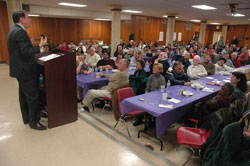Lenten speaker says faith can help further the common good

Robert Royal, president of the Washington-based Faith and Reason Institute and graduate dean of the Catholic Distance University, speaks to approximately 180 people on Feb. 27 at Our Lady of the Most Holy Rosary Parish in Indianapolis during its Lenten “Spaghetti and Spirituality” series. Royal emphasized to his audience that it is the special role of the Catholic laity to “take Catholic principles and to see that they permeate … free societies.” (Photo by Sean Gallagher)
By Sean Gallagher
How are individual Catholics to apply their faith to everyday circumstances as well as to political discussions on the local, state and national levels in a society filled with people who profess a multitude of religions or none at all?
This was the question that Robert Royal sought to answer in a presentation on Feb. 27 at Our Lady of the Most Holy Rosary Parish in Indianapolis as part of its Lenten “Spaghetti and Spirituality” adult faith formation speaker series. (Listen to the presenation here -- 26 MB; .mp3 format)
Royal is the president of the Washington-based Faith and Reason Institute (www.frinstitute.org), and the author of several books about the intersection of faith and public life. He is also the graduate dean for the Catholic Distance University (www.cdu.edu).
At the start of his remarks, Royal sought to distinguish between a society being secular, which he said is true to varying degrees in every age, and a secularism that has been growing in strength in some societies during the past several decades.
“Secularism is something quite different than that secular space where all voices—religious and non-religious—are welcome,” Royal said. “Secularism is not neutral. It is a substantive position like Methodism or Marxism or Catholicism.”
He said that Catholics in the United States, speaking from the perspective of their faith, can do much to oppose injustice, especially to those who are most vulnerable in our society.
“The Church is fulfilling its own proper role toward a proper secular order when it opposes these things,” Royal said. “And it has a right to say secularism should not be because it is not a fair system in a democracy.”
He also said that religion needs to play a role in discussions about the right ordering of society because it is being
re-energized more and more around the world, despite sociological theories from the past that foresaw a gradual secularization of society.
Royal said that the fact that the emergence of a new generation of “militant atheists,” such as Richard Dawkins (author of the recently published The God Delusion) and Christopher Hitchens (who recently wrote God Is Not Great) points to the strength of religion, not to its weakness.
“It’s clear you don’t attack something that is weak,” Royal said. “One of the reasons why the secularists are so irritated at the moment and are coming forth with these attacks on all religion is that religion remains powerful in the world.”
Royal also pointed out the continuing power of religion in the world by discussing a speech made last December in Rome by French President Nicolas Sarkozy.
Since its revolution in the late 18th century, France has been known for its growing separation of religion from discussion of public matters, which in French culture is called “laïcité.”
In his speech, however, Sarkozy said that France has to respect the role of faith in its history and the wisdom that religious traditions can offer today to French society.
“Imagine if even in France this sort of argument is starting to be made, people have started to understand something dangerous about what happens when we have a strictly secularist society in which religious voices cannot speak,” Royal said.
He said Catholic voices in the United States “need to be bold” in speaking about public matters on which their faith can make contributions to further the common good.
This is important because there are trends in our society and culture that are putting millions of lives at risk and having terrible effects on the lives of the most poor among us.
Royal argued that, contrary to the “militant atheists,” it is not so much organized religion that has been a source of violence in the world as “organized irreligion.”
Royal noted that, in the 20th century, communist regimes built on atheism were responsible for some 100 million deaths and that Nazism, which promoted a “scientific racism,” accounted for another 40 million deaths.
“But we should not take for granted in our Western democracies that we’ve entirely escaped those sorts of slaughters of the innocents,” he said. “We know that in this country, since abortion has been legalized, 50 million babies have died in the womb. In other words, Roe v. Wade has killed more children in the womb than Nazism killed in the 20th century.”
Royal emphasized that injecting a Catholic perspective on discussions of public affairs is primarily the role of the laity, something that the Second Vatican Council highlighted.
“The specific role of the laity is to take Catholic principles and to see that they permeate these free societies,” Royal said. “And to do that is hard.
“It means being very quick on your feet, and knowing how to argue and when to argue and when not to argue. It means knowing what you’re talking about. It means being courageous. And one of the hardest things for most people is to say some hard things when it can have social and maybe even professional consequences.”
Royal exhorted his listeners, in this season of Lent, to grow in holiness for the sake of the common good.
“It’s the way of holiness that will hold our identities as Catholics together,” Royal said. “And count on it. It will transform not only your families, not only your communities. It can transform America and it can transform the world. That’s why Jesus came into the world and asked his disciples to preach the Gospel to all nations.”†
